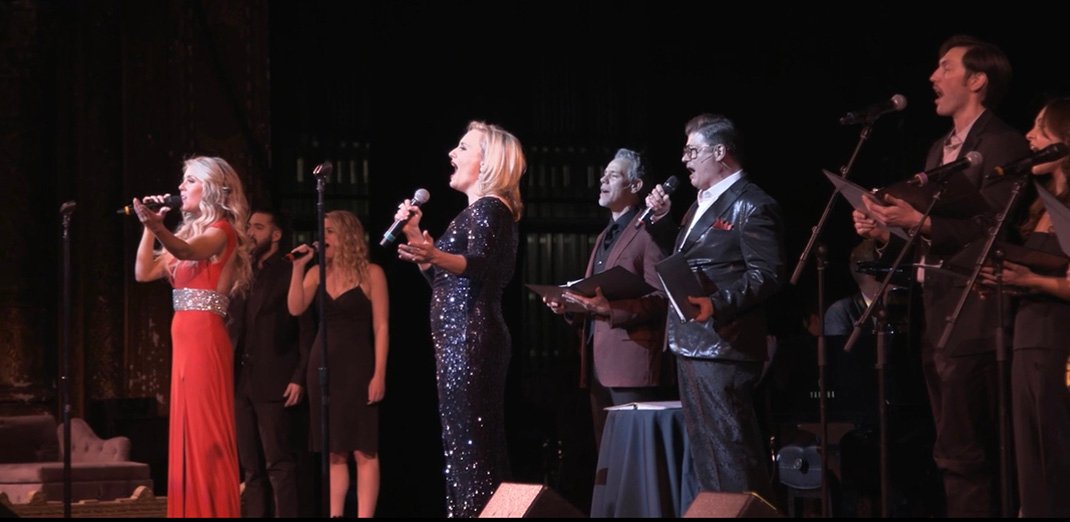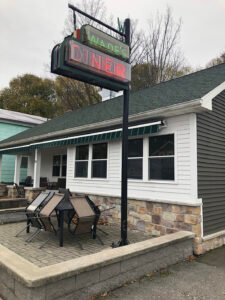The Oswego native had ‘A Girl I Know’ staged at the Landmark Theater earlier this year and hopes to have it on a Broadway stage in the future
By Stefan Yablonski
 John P. Riley solves complex employment-based immigration matters for corporations, nonprofit institutions and professionals, across a wide range of industries, including construction and engineering, pharmaceuticals, biotech, fashion, insurance, medical, manufacturing and software, among others.
John P. Riley solves complex employment-based immigration matters for corporations, nonprofit institutions and professionals, across a wide range of industries, including construction and engineering, pharmaceuticals, biotech, fashion, insurance, medical, manufacturing and software, among others.
The Oswego native currently works as an attorney with Bond Schoeneck & King in Syracuse.
In his free time he pursues his other passion — composing musicals.
The attorney with a professional music background — he has an undergrad degree in piano — composed “A Girl I Know” during the pandemic. The show debuted at the Landmark Theatre in Syracuse in February. He wanted to get feedback from a Central New York audience that he “respects and trusts.”
He previewed it in concert form as he hopes to bring it to Broadway.
“I graduated in 1998 from Oswego High School. Graduated from Ithaca College and later got my Juris Doctorate degree from the law school at University of Pittsburgh,” he said.
He didn’t get into law until after undergrad, he added.
“I took a year off and was trying to decide what to do,” he explained. “I went to law school, didn’t really know what I was getting into.
“I did a summer abroad program. I did a fellowship for like East Asian languages. After I graduated law school, I was working in Pittsburgh. But then I had an opportunity to continue the fellowship in Korea, so I went there.”
Before joining Bond Schoeneck & King, Riley represented several of Korea’s largest multinational conglomerates with their business immigration management. He also taught corporate law and litigation for 11 years in Seoul as an assistant professor of law at Sogang University and Dongguk University. His private practice also included working for two Pennsylvania law firms practicing in immigration, professional malpractice, commercial litigation, real property and products liability.
“I was in Korea 2008 to 2022. In October 2022 I started at Bond Schoeneck & King,” he said.
He said he started writing songs during COVID-19.
“I had a lot more time on my hands — like everybody else. I wrote them, orchestrated them and put them into a story. I have three [musicals], two that I did while I was in Korea and I have been trying to get one of those produced recently. Then there is another one I am kind of wrapping up right now.”
Who is the girl?
 “No, it’s not someone I know,” he laughed. “[‘A Girl I Know’] is just the title of one of the songs and it ended up becoming the title of the show. It’s basically a dark comedy — like ‘Legally Blonde’ meets ‘Sweeny Todd’. She’s a dark woman. It’s like that or maybe like Dexter. It has early Broadway kind of numbers, like the early ‘40s sounds.”
“No, it’s not someone I know,” he laughed. “[‘A Girl I Know’] is just the title of one of the songs and it ended up becoming the title of the show. It’s basically a dark comedy — like ‘Legally Blonde’ meets ‘Sweeny Todd’. She’s a dark woman. It’s like that or maybe like Dexter. It has early Broadway kind of numbers, like the early ‘40s sounds.”
Love, obsession and twisted desires collide to take you on a musical journey through the mind of a femme fatale. Smart, sexy and just the right amount of crazy, ‘A Girl I Know’ tells the story of the stunning protagonist, Jeni, the men obsessed with her and a beautifully twisted, fiercely protective mother.
The show explores dark emotions in a suspenseful and visceral way, according to Riley.
The Landmark production featured prominent Broadway performers, Adam Pascal, Rob Evan, Haley Swindal and Chloe Lowery, with local performers and orchestral music inspired by Gershwin and a timeless style.
The concert aimed to gather audience feedback to aid in the potential development of a full musical for Broadway.
“It’s hard to get anything produced in New York [City]. Most Broadway shows require 10 years for development before you see them on stage. You have to raise a lot of money,” he said. “The only way to make any money, have something commercially viable, to do something on Broadway requires a ton of money.
“There just aren’t a lot of Broadway size theaters in New York. I did a concert version at the Landmark. I hadn’t performed [‘A Girl I Know’] with a live orchestra before. It was all done with software, a piano and some smaller instruments; but like a full orchestra. That was something we wanted to do — see what it sounded like with a full orchestra and get the audience response … get somebody interested in producing the show.”
They had a great crowd in Syracuse.
“I don’t remember exactly how many, maybe 1,500 or 1,600. It was a great crowd. I don’t really remember much because there was just so much going on. People said it was good,” he said.
Right now he is working on getting a theater in New York City.There are a lot of steps to take, he added.
“I have already done this show — performed it a few times in the smaller theaters,” he said. “We’re in the raising money stage. There are like a dozen unions you have to work with in New York. So you need a lot of money in order to be able to get something on stage. That’s in process right now.”
He is working on another musical right now with a Christmas theme. He might do it in New York or he may do it regionally, he said. “I want to get it somewhere for Christmas. It’s a variation on ‘A Christmas Carol by Dickens,’” he added.
Riley said he probably won’t ever retire from law and become a full-time playwright.
“The chances of that happening are very, very low. Theater is a risky business. It’s a very low chance that you will have a show that makes money. I don’t foresee myself ever quitting law to do that full-time. It can cost $12 to $14 million to get a show up,” he explained. “Even for successful shows that you would know the names of, they have to be in New York for a year and then maybe they recoup their money in that year; but more likely they recoup it long term, over regional theater performances. Even if something does become a hit it takes a lot of money. It’s a long-term investment. To develop something, get butts in the seats, get people to actually come out and watch is very difficult.”
“I just did it here [in Syracuse]. We had a 2,500 seat theater. It required a ton of marketing, a ton of money,” he continued. “Getting the word out and people are like, ‘what is that?’ And you have to keep hitting it again and again. You basically have to have very well-known people that you can attach a project to just so you have something to sell to people.”
“If you can make a brand-new show that no one has ever heard of —’ Brittany Spears the Musical’, for instance — it’s a much easier sell. In addition to all the production costs, finding a theater, raising enough money, you have to have a massive budget for getting the word out. There are a lot of upfront costs,” he continued. “Broadway has a super thin profit margin. You see shows that are packed and they close after a month or two months. How can a theater packed with 1,700 people every day close? Theaters are not that big in New York City. That’s one of the reasons people like it there. Landmark is much bigger than most Broadway theaters.”
Where does he find the inspiration?
“I worked on the shows through COVID. So I had a lot of free time. Basically — inspirational wise — I don’t know. Nobody really knows; it either comes out or it doesn’t. I usually write at night after work. That is kind of an escape for me. So if I can entertain myself that’s great,” he said. “If the next day I can remember something I played great — I don’t record anything. I don’t write anything down. I just try to remember that melody from yesterday. One out of every 20 things I write down becomes something. That’s a pretty low percentage. I just play around with things to see what I actually liked about it.”




